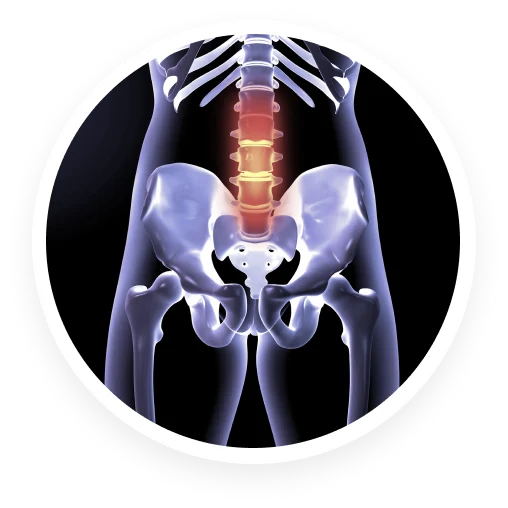
Lower Back Pain
Nearly 80% of adults suffer from lower back pain and almost 20% of adults report having low back pain within the last 90 days.
Allen Finney
Review
Young ladies behind the counter were nice and professional. Dr. Khan was and is awesome. You felt he really cared which I have not felt in the 2 years I've been injured. Only reason I did not give it 5 stars was the hard time I had finding it.
Allen Finney
Review
Young ladies behind the counter were nice and professional. Dr. Khan was and is awesome. You felt he really cared which I have not felt in the 2 years I've been injured. Only reason I did not give it 5 stars was the hard time I had finding it.
charles griffin
Review
Have been doing a wonderful job with help with my nerve pain, listen to me, and my request no to be put on pain killers but to help find the problem, always return calls so glad is was referred to them.
Stacey Mejia
Review
Awesome staff Dr. Kahn is a really good Doctor he listens and is a helping man!! I appreciate all of your guys work you do for your patients!! You even call to give reminder the day before your appointment! Again that's so awesome!!
Forrest Hammer
Review
NOTHING BUT THE BEST. ABLE TO WALK. ABLE TO PERFORM TASKS THAT I COULDN'T FOR A LONG TIME, LIKE DAILY WALKING, BENDING OVER, CARRYING GROCERIES AND ENJOYING A MOVIE AT THE CINEMA. THANK YOU DR. ASIM KAHN.
Jeanne Neathery
Review
Dr RYklin is amazing. He treats each patient as if you’re his only one. I’ve been seeing him for 7yrs due to a neck injury. He definitely finds what pain management meets your individual needs. The practitioners are amazing as well!!!!
Marty Klopper
Review
Pain Dr office. Staff is friendly and professional. Lots of paper work to be filled out. Office was clean and neat. Masks on Staff at all times and required for patients to enter. Will be going back for follow-up appointments.
Kim LindL
Review
The staff is very pleasant and Dr. Khan is very good with a needle I've been getting epidurals and shots in my foot and lower back for about 4 years now, he is very good and I would never go to another place
Angel Bussert
Review
The doctor actually listens. I have been a patient for years and love the staff and doctors. I've been to all the locations the country club one is always super busy queen creek location is never packed so I go there.
Guy Romero Jr
Review
Every Staff personnel are very professional, courteous and patient respectful in caring for each medical problem. We live out in Laveen, but finding good patient care are hard to find, Truly Blessed Guy E Romero
John Crosby
Review
They do a great job in today's challenging health care system. Great Nurse Practitioners who work hard. Great support staff. Doctors are expert practitioners. Stable practice. I have over five years personal experience with them.
Stacey Mejia
Review
Awesome staff Dr. Kahn is a really good Doctor he listens and is a helping man!! I appreciate all of your guys work you do for your patients!! You even call to give reminder the day before your appointment! Again that's so awesome!!
Kim LindL
Review
The staff is very pleasant and Dr. Khan is very good with a needle I've been getting epidurals and shots in my foot and lower back for about 4 years now, he is very good and I would never go to another place
Guy Romero Jr
Review
Every Staff personnel are very professional, courteous and patient respectful in caring for each medical problem. We live out in Laveen, but finding good patient care are hard to find, Truly Blessed Guy E Romero
Angel Bussert
Review
The doctor actually listens. I have been a patient for years and love the staff and doctors. I've been to all the locations the country club one is always super busy queen creek location is never packed so I go there.
Forrest Hammer
Review
NOTHING BUT THE BEST. ABLE TO WALK. ABLE TO PERFORM TASKS THAT I COULDN'T FOR A LONG TIME, LIKE DAILY WALKING, BENDING OVER, CARRYING GROCERIES AND ENJOYING A MOVIE AT THE CINEMA. THANK YOU DR. ASIM KAHN.
Jeanne Neathery
Review
Dr RYklin is amazing. He treats each patient as if you’re his only one. I’ve been seeing him for 7yrs due to a neck injury. He definitely finds what pain management meets your individual needs. The practitioners are amazing as well!!!!
Marty Klopper
Review
Pain Dr office. Staff is friendly and professional. Lots of paper work to be filled out. Office was clean and neat. Masks on Staff at all times and required for patients to enter. Will be going back for follow-up appointments.
John Crosby
Review
They do a great job in today's challenging health care system. Great Nurse Practitioners who work hard. Great support staff. Doctors are expert practitioners. Stable practice. I have over five years personal experience with them.
Carol Gravatt Davidson
Review
Absolutely the best place I have been too...so many doctors and always just prescribed pain pills for over 10 years. There is hope, after starting injections I feel so much better. I know I'm in the right place.
Tim Tuzon
Review
Been with Kahn for over a year and wouldn't want to be anywhere else. He is not a pharmacy! He solves the issues instead of hiding them with tons of drugs. Have had multiple procedures to correct the problems.
Brooke Keifer
Review
I was nervous when I brought my mom into the office. They are clearly a very busy office, but the front staff was kind, and the doctor was very confident in a treatment plan. Overall my Mom was very pleased with her visit.
Kari Lynn Plo
Review
I love Dr Ryklin and his assistant Liza! They've always been super good to me and very sympathetic to all my needs! They've done everything they can to make me comfortable and to help me with my pain! I'd refer anyone to them!
Lacey Smithson
Review
This office keeps getting better every time I go. Staff is friendly, doctors are very well educated and good at what they do. And they have helped decrease my mom's back pain by 80%! Everyone with pain should go to this place!
Katty Miller
Review
Dr. Khan is truly carrying, understanding and the VERY BEST AT ADMINISTRATING SGB INJECTIONS!!! I look forward to driving from California to be seen by him. I just can't say enough. Thank you Dr. Khan.
Britt Montoya
Review
Great place. Dr Khan is an awesome Dr and goes above and beyond to help you. Meghan is a wonderful P.A. as well. It says so much to have a Dr that truly cares about your outcome of your procedures. This is a goodhearted Dr
Julie Kierzek (Julz)
Review
Love them all. Dr Ryklin is so helpful and understanding. He takes helping people seriously & I'm extremely grateful for everything he & the PA's & MA's have done for me. Dr Ryklin has gone above & beyond for me.
Delicia N
Review
The team here are genuinely the most helpful providers I have ever had. I went through my worst lupus flare ever last year and mentally did not think I would make it. They truly saved me and made me feel like I could ask for help!
Caroline Copeland
Review
We are Dr. Ryklin's patients. He is an amazing pain management physician. All of the treatments that we receive work extraordinarily well. His entire staff, from front to back, are exceptional. Patient care is really the specialty here.
Eva Linda Hemmerling
Review
I'm a patient Dr. Khan/ NP Liza. I find Doc Liza caring always interested in me as a whole. Body/Mind/soul. Find comfort in her. Staff Dustin,Amanda are tops also. I highly recommend AZ Spine Institute. E.L.H.
Charles Eberhardt
Review
I have been to the Vineyard location 12 times and this is the best Doctor's office I have ever been to. The staff is by far the friendliest and most caring staff around. I actually look forward to my visits. Thanks for everything.
Becky Kirby
Review
For the last 12 years, Arizona pain and spine in Queen Creek with Lisa, has taken care of my pain issues. Without her, I wouldn't be able to manage the excruciating pain I have had after my time in the service

What is lower back pain?
It is a common reason for missed work. In 1990, it was ranked as the sixth most common medical condition. By 2010, it rose to the third most common condition.
Pain in this region can range from mild to very severe. It tends to impact the lives of both men and women equally. Those with a sedentary lifestyle are likely to develop some form of back pain. Many of these conditions are the result of accidents or from lifting heavy objects.
The majority of these conditions are considered to be short-term or acute, lasting no more than several weeks. Acute back pain tends to involve mechanical problems with the spine, back muscles, nerves or intervertebral discs. When these conditions extend to a period of time between four and twelve weeks, they are considered subacute.
A chronic back problem lasts for at least 12 weeks. Roughly 20% of those who suffer from acute lower back pain will later develop chronic problems. Those experiencing chronic pain are very likely to consider medical treatment options.
What are the symptoms of lower back pain?
Many individuals will experience numbness in the leg, foot, and groin region when a low back condition exists. Some people will have difficulty going to the bathroom and experience feelings of nausea, fever and chills. Those with lower back pain that is due to an injury or is very intense should seek medical attention.
The lower area of the spine is called the lumbar spine. It is composed of a series of vertebrae known as L1 to L5. This part of the spine is critical to normal daily functioning. It absorbs a significant amount of body weight. Pain in this region is likely to radiate into the legs.
Just below the lumbar spine is the sacral region. It is composed of a series of vertebrae known as S1 to S5 which link the spine to the pelvis. The tailbone (coccyx) is composed of four bones creating the lumbosacral joint. Due to the interconnected nature of these parts, damage to one area can create pain elsewhere.
What causes lower back pain?
The most common causes of low back pain are strains or sprains. A sprain results from overextension that creates a ligament tear. When the overstretching occurs involving a tendon or muscles it is called a strain. These injuries can result from participating in sports, lifting heavy objects, and repeated use.
Other common causes of lower back pain include:
-
Sciatica
-
Cauda Equina Syndrome
-
Spinal Infection
-
Ankylosing Spondylitis
-
Arthritis
-
Spinal Stenosis
-
Scoliosis
-
Cancer
-
Pregnancy
How is lower back pain treated?
Lower back pain is typically treated either surgically, non-surgically, or by a combination of the two. The following are some of the most common surgical solutions to lower back pain.
Spinal fusion involves “welding” the larger bones of the spine. The bones may also be stabilized with rods, screws, and other hardware. It is often used to correct an irregularly shaped spine or when joints are unstable and create pain when movement occurs.
A laminectomy creates space that allows relief in the nerves of the spine. A plate of bone known as the lamina is removed. The procedure is now highly successful in relieving pain. A discectomy is another procedure used to reduce problems associated with the discs of the back.
The surgeon will generally access the region by making a small incision. There are two primary types of discectomy as follows:
- Percutaneous: A part of the disc is removed using a device that is extended through the incision.
- Microsurgical: An incision that is less than one inch is made. A microscope is then used by the surgeon to remove disc fragments to provide relief.
When there are fractures in the vertebrae, the surgeon may perform vertebroplasty or kyphoplasty. These procedures involve applying a stabilizing material that is similar to cement. The purpose is to restore the vertebrae to the proper alignment and spacing.
Non-surgical options often include:
- Physical therapy
- Prescription medications
- Massage therapy
- Alternative medicine
AZ Pain and Spine Institute
Lower Back Pain Treatments
Here at Arizona Pain and Spine Institute, we improve our patients’ quality of life by alleviating and managing their pain. Some of our Lower Back Pain treatments include:

Why choose AZ Pain and Spine Institute to treat your Lower Back Pain?
We have a team of medical practitioners, pain management doctors, and staff who are experts on pain management, including Lower Back Pain. We use state-of-the-art technology and effective approaches in achieving our mission. We care about your well-being and are committed to making your life pain-free.
